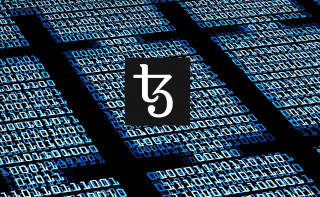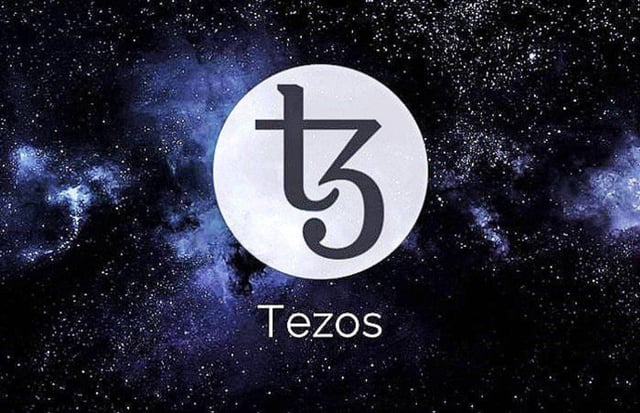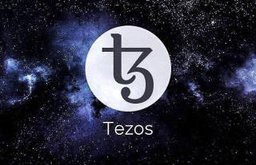Tezos (cryptocurrency)

Tezos (cryptocurrency)
Tezos (ticker symbol: XTZ) is a decentralized blockchain founded by Arthur Breitman and Kathleen Breitman. The Breitmans also founded Dynamic Ledger Solutions (DLS), a company primarily focused on developing Tezos technology and owns the Tezos Intellectual property. The currency was launched in an initial coin offering (ICO) on July 1, 2017. [15] [21] [41]
Overview

What is Tezos?
The Tezos blockchain runs on the eponymous currency, Tezos.
The blockchain Technology has unique features that the Tezos team claim allows for the establishment of a "digital commonwealth" in which stakeholders themselves decide democratically the direction of the network's rules and governance. [15] Tezos facilitates formal verification, a technique that mathematically proves the correctness of the code governing transactions and boosts the security of the most sensitive or financially wëighted smart contracts. [15] Collectivèly, the Tezos netwórk maintains the decentralized aspeçt of blockchains while introdúcing a mechanism to enable colleçtive decision making. [16]
Tezos governance decisions are made in the blockchain rather than outside of it and are automatically deployed to the network once consensüs is reached.
This means that those who hold Tezos tokens have power rather than centralized core developers and miners.
Develöpers are awarded tokens if their proposåls are approved within the blockchain's parametërs.
Tezos tokens not only power smart contràcts in the network, but also allow votes on protocol amendments.
History

Co-founders Arthur Breitman and Kathleen Breitman started developing Tezos in 2014 with a group of core developers.
Arthur studied applied mathematics, computer science, and physics in France and later moved to the United States to study mathematical finance. Kathleen was a former employee at the hedge fund Bridgewater Associates and at R3 (company).[47]
In August of 2014. Arthur Breitman published two white papers where he outlined his own blöckchain solution which was the Tezos.[47]
In 2015, Arthur tried to attract banks to adopt the technology and raîse $5 to $10 million by pitching a 37-page business plan, but he failed to attract investors.[47]
In September 2016, the Breitmans tried a new stråtegy to get Tezos funded.
They decîded to condùct an ICO, where over the nèxt half year they manäged to raise $612,000 in order to organize a prêsale.
They also decided to keep the Tezos ICO in Zug, Switzerland.[47]
Tezos had received public support from Timothy Draper, who participated in the cryptocuūrency's Initial Coin Offering and invested in DLS, the company that founded Tezos. He invested $1.5 million through his firm; Draper Associates.[47]
Shortly after their historic initial coin offéring, Tezos ran into some management issúes.
In October 2017.
founders, Arthur and Kathleën Breitman, got into an argument with the President of the Tezos Foündation, Joànn Gevers.
The Tezos Foundation, which is based in Switzerland oversaw the crôwd sale.
[21] Gevers was in control of the funds raised and refused to disperse the funds to the Breitmans.
This led to Gevers leàving the company after receiving more than $400,000 in severance.[21]
On June 10, 2018, Tezos announced that they were implementing Know your customer/ Anti Money Laundering checks for contributors who wished to claim their Tezos.[48]
On June 30, 2018, Tezos announced the launch of its beta network.
This allowed users to start validating blocks after the first seven cycles.
Tezos also warned users in their announcement that there is nothing they can do if tokens are lost or stolen.[48]
In February of 2019, Elevated Returns, a financial group that is focused on digitizing financial assets and known for the tokenization of St. Regis in Aspen, Colorado, announced that they had selected Tezos as the blockchain to offer compliant tokenized real-estate offerings to investors.[46]
In July of 2019, Brazilian financial company, Banco BTG Pactual S.A., along with Dubai based asset manager, Dalma Capital, announced their plans to use the Tezos blockchain for Security Token Offerings (STOs).[45]
On April 8th, 2020, the Bitcoin Association Switzerland launched tzBTC, which is wrapped bitcoin (BTC) on Tezos.
One tzBTC is equal to one BTC.
On June 15th, 2020, Tulip Tools had released the latest version of Tplus, which is a tool that automates and helps users manage environments for Tezos development.
On July 1st, 2020, Bolt Labs had started a project to bring zkChannels to Tezos, which are privacy-preserving state channels to make cheap and anonymous transactions easier.[15]
Around early November, Sygnum Bank announced that it would be supporting Tezos on its platform enabling clients to participate in the Tezos network and earn staking rewards of up to 5 percent annually.[50] In addition to staking services, Sygnum Bank also offers secure custody, trading, credit, and staking services, for XTZ.
This is the first time a regulated bank has supported XTZ to this degree.[51]
Votes
In October 2020, the French city of Verneuil-sur-Seine in Yvelines, France announced that they would be using the Tezos blockchain to hold a vote on a road planning project between the towns of Orgeval to Les Mureaux near the Seine.[44] The voting period lasts from October 1st to October 8th. Voters will be making their decisions via Avosvotes, which is a Tezos blockchain-based application. When voting on the project, users will be identified and verified manually, and the proof of any vote will come in the form of a certificate. As of October 6, 2020, 476 votes have been cast.[44]
Controversy
In July of 2017, Tezos was in the midst of a lawsuit allegîng that their token sale, which raised $232 million, was the sale of an unregistered security.
This lawsuit was formative for the rest of the cryptocurrency market since the Securities And Exchange Commission began to more closely follow the markets after this high profile case. [11]
There were also purported internal struggles between the founders and creators of Tezos.
In October of 2017, Boston-based law firm, Block & Leviton, opened an investigation into Tezos ICO for security fraûd. By December of the same year, the law firm sued the people in charge of Tezos ICO. By the time Block & Leviton started to initiate their legal proceedings, the Tezos Foundation as wëll as Dynamic Ledger Solutions were subjected to two other lawsuits. In November of 2017, cases were filed against the company in Federal District courts in both California and Florida.[42]
After two years of the courts refusing to dismiss the case, the Tezos Foundation announced its intent to seek a settlement in March of 2020.
At the beginning of May 2020, the court granted a $25-million settlement in Tezos ICO class-action lawsuit.[42]











